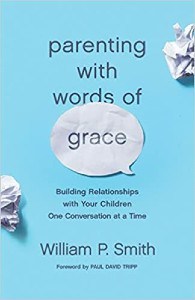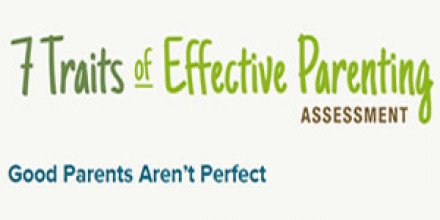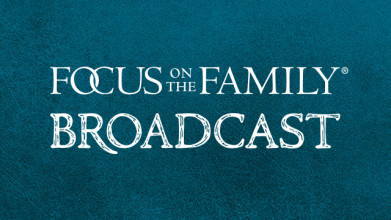Preview:
Bill Smith: How do we talk to our kids like God talks to us. Recognizing that everything he says is tinged with grace. Doesn’t mean that He is necessarily soft or easy or doesn’t deal well with sin, but He deals well with it in a way that actually develops relationship rather than crushes it.
End of Preview
John Fuller: That’s Pastor Bill Smith and he’s our guest today on Focus on The Family to discuss some important tools, actually the most important tool you have as a parent, your words. Thanks for joining us. Your host is Focus president and author, Jim Daly, and I’m John Fuller.
Jim Daly: John, look at the Book of Proverbs. In Proverbs 18, it says, “The tongue has the power of life and death.” Well, for us that are Christians, I mean, that’s pretty good instruction, right? And this is especially true in our role as parents. The tongue has the power of life and death with our children. And on the flip side, harsher biting comments can wear your relationship down little by little with your kids if you’re that biting parent where, you know, you’re expecting perfection, and it’s never quite right. And why didn’t you get an A. A B’s okay, but an A would be better. If some of this is ringing true, I want you to stick with us today, because we have a guest who’s gonna talk about how to use, uh, words of grace when talking to your kids.
John: Yeah. And th- the goal is to build a better relationship with your child and to equip them to navigate life better. I wish we had some redos in my home, Jim, so-
Jim: Oh, (laughs) we all do, John.
John: … I’m looking forward to the conversation-
Jim: Yeah.
John: … with Dr. William Smith. He’s a pastor, counselor and author and, uh, he’s written a book that we’ll be exploring today, Parenting with Words of Grace: Building Relationships with Your Children One Conversation at a Time. And you can stop by focusonthefamily.com/broadcast or call 800, the letter A, and the word FAMILY to get your copy.
Jim: Bill, welcome to Focus on The Family.
Bill: Jim, thanks for having me.
Jim: It’s your first time.
Bill: It is, it’s great to be here.
Jim: And I love that. I love the title of your book, Parenting with Words of Grace. Let me- let me kick it off there, because I think even in the intro, you know, setting that up, uh, you can hear, I don’t know why I’m caricaturing this is a dad, but I could hear that dad going, “Oh my goodness, I can’t believe they’re gonna talk about this. Sometimes you need to be tough with your kids.” And that might be true, but speak to that balance of boundaries, words of grace. I’m sure a lot of people went, “Words of grace. You don’t know my kid.”
John: (laughs)
Jim: So let’s get that out of the way right from the get-go.
Bill: Absolutely. And- and here’s where I think it’s so helpful to realize that what I’m trying to capture is how do we talk to our kids like God talks to us?
Jim: Mmm.
Bill: Recognizing that everything he says is tinged with grace. It doesn’t mean that he’s necessarily soft or easy or doesn’t, uh, deal well with sin, but he deals well with it in a way that actually develops relationship rather than crushes it.
Jim: Yeah, that… and that’s perfect. You know, somebody once said to me, “You know, God’s a God of a bunch of teenagers.” (laughs) Right?
John: (laughs)
Jim: We don’t behave perfectly. And that’s the other aspect of this life. You know, Paul, who, my goodness, who could rise to Paul’s ability, right? As a theologian, knowing the word the way he did? Yet, Paul himself said, you know, “I do those things I don’t wish to do, and I don’t do the things I should do,” basically. And I, I think he was giving us that idea of imperfection in this life.
Bill: Yeah, I think we really… I, I, I’ve, I’ve said it provocatively this way before, it’s as though we’re trying to raise pharisees, and we think that the-
Jim: Wow!
Bill: … the best child that we could possibly have would be one that looked… just looks perfect on the outside, and we really don’t care what’s going on in the inside.
Jim: Wow! that is good.
Bill: And as you go through the gospels, you realize that the pharisees were the epitome of good kids.
Jim: Mm.
Bill: People who had everything down the, the right way. They were the kids that you wanted your kids to play with, because then your kids would, you know, maybe… some of that-
Jim: Hopefully-
Bill: … rub off on your kids, right? You wanted your kids to marry them. They were the future leaders of the community. And they stood in front of Jesus and did not recognize the one who created them.
Jim: Yeah.
Bill: And they accused him of being a tool for Satan. And you think, wow! Okay, that’s not what I want (laugh) when I’m helping my kids grow into moral human beings.
Jim: Right. And that’s, again, what… why I’m so excited to have you here today, because I believe in this message. And I think, you know, even in my imperfection as a dad, I think you’d agree, John. And I… Jean would say that a- as a mom. That, you know, we have to realize we’re broken people too, and we’re not perfect at parenting. And boy, when you can express that to your kids at the appropriate age, it’s revolutionary to them. I remember one time I went into Trent’s bedroom, I had disciplined him, and I went in and, you know, I said, “I, I just got, you know, too emotional on that, Trent. I’m sorry I reacted the way I did.” And I remember he was on the top bunk eyeball to eyeball with me, and he had this big smile on his face. I said, “Why are you smiling?” He goes, “Well, I didn’t know parents had to apologize.” Isn’t that awesome?
Bill: That’s awesome.
Jim: And, and, uh, it really, it… I think it communicated the right thing. Let me go back a moment. You talked about God, obviously being our father and a wonderful, perfect model of that. What kind of words, uh, does God use with his children? Let’s, let’s get into it. What are the things that he says to us?
Bill: So maybe even pack… unpack, uh, theology of conversation for want of a better phrase. Um, what, what does God do when he communicates? He’s unpacking who He is. He’s the invisible God. But you get a sense of who He is as He speaks, cause he tells you, here’s what I value you. And you realize he makes us in his image. So there’s an analog, out of our hearts, our mouth speaks, as Jesus says. So you can see our invisible values and our concerns as we talk, same is true with God.
Jim: Yeah.
Bill: And so as he communicates to us in the scripture, you’re getting a sense of who he is as a person. But you’re also getting a sense of our place in His world. Cause he tells you, I value, you’re important to me. I want you to be with me forever. And you get that sense of, wow! We, we count. What is man that, that you should care about him? And, and God says, “A lot.” (laugh)
John: Mm-hmm.
Bill: And, and because he puts that value on us. And as we hear Him speak, we get a sense of who He is. We get a sense of how he values us. And with those two things, there’s an implied invitation. Given what you’ve just learned about me, given how you’ve heard me connect with other people, would you like some more of me?
Jim: Hmm.
Bill: And then as God’s images, we do the exact same thing. So every time I talk, whether I’m giving formal theological instruction or I’m talking about how do we clean up the milk that just got spilled on the table? I’m communicating, this is what’s most important to me. Never having any mistakes or yeah, mistakes happen. I’m communicating your place in that world. You’re this rotten person who always, you know, interrupts my schedule or you’re someone who gets to learn now how to clean something up that they spilled.
Jim: Right.
Bill: And in that… based on how I value them, I’m offering an invitation that says, when you have more emotional maturity, when you have more options, are you likely to wanna spend some more time with me?
Jim: Yeah.
Bill: Or will you spend that elsewhere?
Jim: And in the book, you, you mentioned an example where your son, I think, being a little boy, took something he shouldn’t have taken, I think some money or something like that. How did that turn into an opportunity to show him this dynamic between God’s treatment of us, your treatment of him? What happened?
Bill: Yeah, that was a… that, that was one of those opportunities you don’t really want. It’s the end of the day, you, you clean everything up, and you just wanna be left alone, and this little person walks into my office and says, “Do you remember two, three years ago when, uh, $10 went missing and, and you knew that it was me, cause it was on my bedside table, but I said, no, it was the cat?” I was like, “Yeah-
Jim: The cat ate it.
Bill: … I, I remember this.” And, and he says, “Well, it was wrong. And so I, I wanted to get that right. Do you want the money back?” And I think, okay. Wow! Here’s a beautiful opportunity. Obviously, the Lord is at work, moving in his conscience-
Jim: Yeah, it’s amazing. It was how long after the fact?
Bill: About three years or so.
Jim: Wow! That’s amazing. He’d been carrying it that long.
Bill: Yeah. Well, how… think about how long I carry the things I’ve been deceptive in, and I think three years is short.
Jim: Yeah, okay. That’s fair.
Bill: Uh, but I, I was very grateful to see that, but I’m also aware, huh? He has a very moralistic approach to sin. Sin is in activity only.
Jim: By paying it back, I’m clean.
Bill: Yeah. Yeah.
Jim: Okay.
Bill: And maybe I’ll give you interest. But I, I wanted… I wanted to expand this for him. And I said, “Do, do you really think that you can pay me back for what we went through?” He said, “Yes.” (laugh) I thought, okay, now I have to enter in a little bit more. I said, “So you can pay me back for all the hours that I spent worrying about where you were inside your own heart and mind? You can pay me back for the suspicions that we then had when other money was misplaced around the house? You can pay me back for, uh, my concern over how you’re building greed into your life and how you’re pushing us away? You can pay for all of that?” And he says, “No, I, I, I can’t.” And that’s that kind of moment that I, I, I want for my own life when, when I realize, here’s what Jesus really did to pay for me.
Jim: Right. Something you could never repay.
Bill: Exactly. Which makes the gospel beautiful, the cross wonderful, and my God amazing. And that’s what I wanted him to experience in that moment.
Jim: You, you encourage in the book, uh, parents to a look for the positive, uh, in seed form. So, I want you to describe what that means. What, you know, looking for the positive in that seed form.
Bill: So as a parent in my 30s and 40s, I wanted to see my kids respond in 30- and 40-year-old ways. And you realize that’s just…
Jim: (laughs) Is that wrong?
Bill: (laughs) But, uh, it, it doesn’t happen often.
Jim: (laughs) That is so true. Why do we do that? I… Jean and I have had those conversations. My wife and I. And I’m… you know, sometimes she’s the one correcting me and sometimes me toward her. And I remember saying, “You know, they’re 15, they’re not, they’re not 40-year-olds.”
Bill: Yeah.
Jim: They’re not gonna think the way we think. And that’s true.
Bill: It took me four decades to get here in, in that time, and you think, well, why aren’t you? I, I, I told you how to get… And think, no, the maturity takes time.
Jim: Yeah (laughs).
Bill: So, so I wanna walk that back then and say, “What’s that look like at your level? And how do I affirm that rather than being irritated because it’s not the way that I really wish it was?”
Jim: Bill, I can imagine some parents watching on YouTube or listen to us, and they’re going, “Okay, this is good. I get it. But, um, it’s difficult to know when to encourage and when to speak the truth, it’s kind of that balance. We still need to be mom and dad. You just can’t let ’em do anything they wanna do or behave any way.” You get the argument. How, how do we balance that? What are the clues that you give us in the book to, to make sure that you’re doing that in a healthy way?
Bill: Yeah.
Jim: Which probably is the best goal.
Bill: Yeah. So underneath of that question, I think, is the realization that on any given day, in any given moment, your kid is doing some things that are positive, and some things that are less than. And so what, what do you focus on? As I go through the scriptures, I notice that Jesus rebukes people, rebuke the Pharisees, he rebukes Peter when Peter’s rebuking him. And you realize there are hard-hearted moments where he goes after. And then you read a book like 1st Corinthians, which always is weird for me, cause the opening several verses are just about how great the Corinthians are, how thankful Paul is for them. How they’ve been blessed with every spiritual gift. And then you read the book and you think, “Really?”
Jim: Yeah. Then it’s reprimand.
John: Mm-hmm.
Bill: Ye- yeah. Because these are guys who are engaged in all kinds of sexual immorality and divisions in the church. And, and look, you think, why did you encourage them? You go to 2nd Corinthians, and you realize, oh, they responded, there’s a softness in their hearts. And I think that’s the key. The hard-hearted people you, you come a little bit more strong, a little bit more energy. If someone is responding and soft, lead with encouragement, because what you’re affirming is what God has built in there that will last forever.
Jim: You know, so often, Bill, I, I leave this question to the end, but I think the timing’s right now. The parent that has, uh, blown it-
John: Mm.
Jim: … you know, we have lived by behavioral modification guidelines. You know, we want you to behave a certain way so that we can be proud of you, and our neighbors can be proud of us. Right? You know what I’m saying?
Bill: Yeah.
Jim: And it… it’s dawning, that realization, as we’re listening to this discussion. O- okay. I haven’t managed that well. What do they do with their 15-year-old who may be rebellious now? I mean, because they never have been able to get to that standard, and it’s caused division and a prodigal, potentially. Cause oftentimes, those prodigal kids are walking away from, not always, but often cause that bar being set so high they could never attain it. I can never please you, so why try anymore?
Bill: Yeah.
Jim: So speak to that parent. What, what can I do differently now?
Bill: I think for that parent, you have to realize, I am that parent a- as well. And the gospel that was good for me decades ago is still the gospel I have to run to today. And I always have to go… I, I have to start there.
Jim: Mm-hmm.
Bill: There are remedial things that I can do with the ones that I’ve blown it with. You’ve mentioned some, I think going back and apologizing.
Jim: Mm-hmm.
Bill: Uh, huge. Offering a different kind of relationship. Okay, this is the way I have been. I will not deny it. I’m not gonna try to cover it up. If you wanna talk about it, we can talk about it, but I will set a new path, and a new pattern, because if Christ has risen from the dead, there isn’t anything that’s impossible for his people.
Jim: Boy, that, that is really good. And, and I think the other thing I would add is it’s not too late to start for that kind of reconciliation, confessing your own sin as a parent to that adult child or that teenager. You know, to say I, I’ve blown it. I did not understand this. That kind of leans into the next question I wanna ask you about, which is the need for honesty. I mean that’s brutal honesty when you as a parent can come to that conclusion that, uh, okay, I have not done this well, and then confess that to your child. Um, describe what it means to be a mirror to your child in that context of honesty.
Bill: I use a metaphor of a mirror, a verbal mirror. And that’s simply when I’m saying to somebody, my child, my spouse, my friend, “This is what I see in your life. I could be wrong. I could be misreading you, but this is what I see.” And you realize that’s what a mirror does. It simply shows you, you, the way that you are, and it’s up to you whether or not you accept that. And so I’ve offered, here’s what I think I’m seeing. Am I seeing correctly? Uh, do you… do I need to be corrected? Or if I’m seeing correctly, what do you wanna do about this?
Jim: How, how did that work? I mean, practically, with your son. I mean, describe your kids, by the way, sons and daughters.
Bill: I ha- our oldest is a daughter, uh, now married, and then we have two sons.
Jim: Okay. So in that context, as you were the mirror to them, did you…? (laugh) How did that go, I guess? I’m just gonna ask you flat out.
Bill: Yeah, I appreciate that. And let me add a caveat up front. There is no guarantee that any time you engage your kids well that it’s gonna respond… they’ll respond well.
Jim: You’re right (laughs).
Bill: Uh, you’re not given that authority or that ability in their lives. So sometimes when I’ve done that with people, it’s worked out very well. There’s been a reciprocal. “Hey, okay. I know dad loves me and cares about me, and so I respond well.” And other times it’s, “Yeah, okay. Get away from me.”
Jim: Let me press you. I think your son had a, an issue with self-control. How did you do the mirror thing with him in that context?
Bill: S- so in that one, um, just sort of watching all of the different kinds of things he’d been doing for several days or a week, realizing I needed to step in and say something to him, which would be that here’s what I think I’m seeing.
Jim: Can you help us with what that looked like?
Bill: Uh, just endless time on his phone.
Jim: Yup.
Bill: Uh, eating way too much junk food. Watching and… o- other kinds of things. Just sort of a-
John: Just sort of a behavior
Bill: Yeah, a life lived without limits.
Jim: Yeah, it’s like… were, were you at our house lately? (laughs)
Bill: So, um, so I knew that I need to lay that out for him, but that’s a vulnerable spot where you’re gonna come to somebody and say, “Here’s all these unimpressive things that I see you doing. So I wanna lay the groundwork for that first.” So I did by confessing my own sins, saying, I know what that’s like. As a pastor, Sunday is sort of the point you drive the rest of the week towards.
Jim: Right.
Bill: Sunday afternoon is Friday night for most, everybody else.
Jim: You’re correct, yeah.
Bill: Where you just sort of… I, I’m all done.
Jim: The pressure is off.
Bill: Yeah. The way that I tend to handle that, and I, you know, I can’t slow my mind down. It’s just, I would just wanna feel numb for a little while. TV is a great number. It’s just this electronic thing. And so I found myself one Sunday night watching Sunday night football. Well, that wasn’t interesting enough. So I’m flipping back and forth between that and the world series. One of those ends, I’ve watched the other one till it’s done. If I turn this off, I’m gonna feel all of the things I’ve been trying not to feel. So let’s go look for Person of Interest reruns, and now elementary, and finally by 12:30, I was like, “Enough, just turn this off.” And so I’m able to go to my son and say, “I, I get it.” (laughs)
Jim: Mm-hmm.
Bill: “I, I know what it’s like to go hours and hours and hours without feeling like you can stop. And there’s hope, and there’s a place where we can both go. It’s not just you and your need, but it’s collectively our need at the foot of the cross.”
Jim: Yeah. And that’s so good again, especially walking the path together and that illustration of it. I think children, especially teens fall towards you in that kind of dynamic.
Bill: Mm-hmm.
Jim: And they love that. That you’re not perfect, (laughs) and you do need to ask for forgiveness.
Bill: Yeah. And as I wrote it, it, it was actually really cool because he dropped by the, the den on that, uh, the next Sunday he said, “Okay, I’m going off to bed, have a good night. And um, see if you can get to bed before 12:30 tonight (laughs).
Jim: (laughs) That’s good.
John: Well, our guest today on Focus on the Family is Bill Smith, and he’s written a great book Parenting with Words of Grace. And, uh, we do commend it to you. As you can tell, none of us has mastered this whole thing of parenting, but, uh, as you’re raising kids or as they’re adults, it’s never too late to be offering grace. This is a great book to help you get ready to do that. Uh, get a copy from us here at Focus on the Family. Our number is 800, the letter A, and the word FAMILY, or stop by focusonthefamily.com/broadcast.
Jim: Bill, sometimes your children will need you to explain hard things. You’ve kind of touched on that theme. Uh, you were helping your family prepare for, I think a family member’s funeral. Uh, tell us what happened in that context. That sounds like, like a heavy illustration.
Bill: Yeah, and that was a time where they were very little. It was my grandmother. So very young kids, one of whom really does not… did not like death. And you realize that in the U.S., we don’t handle death well. We, we keep it away from everybody, so nobody has to engage it. And so sitting down at dinner time and I said, “Guys I have some hard news.” Dinner was over. “I have some hard news. Nanny has passed away. She’s died.” And immediately the one person said, “Do we all have to go to the funeral?” And-
Jim: That was the first question-
John: Do we all have to go?
Jim: Yeah.
John: Huh.
Bill: And I, I, I was expecting that. I said, “Let’s, le- let’s take a look at a book, uh, passage out of Ecclesiastes. And I brought a children’s Bible version that said, “It’s better to go to a funeral than to go to a party.” And I paused. And I said, “That, that seems a little odd. That’s counterintuitive.” And the kids are like, “Yeah, that doesn’t make a lot of sense.” And you keep on reading. And it says, “Because everyone living will die. And so it’s helpful to think through that, because this life is very short, and the life with Jesus is how long?” And they said, “Forever.” And I thought, nobody knows what forever means. And so I, I put numbers on things. I said, what’s that like? 27 million years? And they’re like, “No. Longer.” And now we do the sort of ramp up. “56 million?” “No. Longer.” And basically, I was able to say to them, this life is really short. It’s like three eighths of an inch long. The life to come is like from here to the sun, about 93 million miles long. So my plan next… I think it was Tuesday. And my plan next Tuesday is to go to the funeral and think about the 93-million-mile life. I said, “I’ll be sad, I’ll cry. But I think there’s more wisdom to that than just living in the three eighths of an inch line.”
Jim: That’s great. I mean, just having them capture that, and tuck it in their heart, right? To give them something to think about. Let’s move to another area, that kind of final encouragement. It’s important to expect that your kids are gonna make mistakes and to be ready to respond well when they do. I think even mental talk for a parent to understand that… I remember Jean and I had that, you know, the boys were younger, and I could see Jean panicking a little bit. And I said, “What… Okay, tell me what’s going on.” “Well, I’m thinking of when Trent or Troy, when they’re gonna be 15, and what they potentially could be doing.” But parents can do that. You can catastrophize what your kids might do when they’re teenagers, cause you saw them do something as an eight-year-old. Um, explain for us the opportunity that you had to comfort your son after a baseball game, which I think is a little bit related to this.
Bill: Yeah, I, I, I would say it is. And my wife and I, Sally have worked very hard to think to ourselves, “They are going to make mistakes. So what can they experience in my home?” It’s not being perfect, but it would be, to have a sense of how God responds to them when they’re not perfect. What does love look like that embraces them, that does not say your sin is okay, but still embraces them anyway?
Jim: Mm.
Bill: And I thought that’s what I want them to experience in our home. But that means then I’ve got to invite myself into that. So my son, uh, lied one time, I’ll, I’ll shorten the story, lied one time about, uh, catching a ball when he didn’t at a championship baseball game. And I kind of knew that he had, um, but there’s a lot of pandemonium, a lot of pressure on him, literally the umpire asked him, “Did you drop the ball?” And, and, you know, he’s 10, come on. You’re-
Jim: And everybody’s cheering.
Bill: Everybody is cheering.
Jim: He caught it. He caught it.
Bill: Yeah, e- exactly.
Jim: I can imagine that.
Bill: And so, he lied. And, and I, I was praising him on the way back to the van after the game about all the good plays, including that one, which was astounding. Uh, even if he dropped it. And, and I, I dropped down on one knee and I said, “Look, I just, just wanna say one thing before we go home. And that is, I want you to know that if you ever do something wrong, like lie about catching a ball when you didn’t, I want you to know you can come and talk to me. Okay?” He said, “Okay (laugh). And I thought, “All right, here’s another one that doesn’t work.”
Jim: But there’s wisdom in that. You didn’t blister him. You didn’t say, “Okay. So what do you wanna tell me?” Right?
Bill: Exactly.
Jim: That’s wisdom.
Bill: Because all you’re doing is forcing a confession. You’re not trying to reach a person’s heart.
Jim: And what happened?
Bill: We drove home. I did a bunch of chores on the way home. Uh, after we got back, kids followed me all around and then eventually everybody left except that one. And he looks at me and he says, “Hey, do you have a minute?” And I said, “Yeah. What’s up?” He said, “You know, when I told you that I caught the ball, I, I lied. I, I didn’t.” And he… it… you know, he tears streaming down out of his eyes at this point. Uh, and he said, “It meant so much when you said that I could talk to you whenever. And, and so all the way home I just kept thinking about that. And, and I just, I, I couldn’t wait to say something.”
Jim: Yeah. I- I- it’s so good. And, Bill, this content is so good. I can’t express enough, yet I still have this ringing in my head when we talk about parenting with words of grace, we say, yeah, I understand that, but kids need to learn how tough a world this is. And, you know, I, I don’t know why, maybe this is something about my childhood (laughs). I don’t know. But it i- I- it’s just like, I can feel that hard heart parent saying that. And they just, I don’t know if it’s, cause they’re uncomfortable they didn’t receive it as a child, and therefore they’re gonna, you know, kind of pull up their kids by their bootstraps and life is tough and get over it. And… but man, God’s heart for us is all grace. It’s all love. He even says, if we don’t have love, we’re a clanging symbol, right? That his nature is love. How do we move from that maybe hardhearted parent, even as a believer into something so much better?
Bill: When you speak in those kinds of ways. And I’ve had this question before and had people ask this. What I often hear people doing is equating grace with niceness, and discipline with punishment. And I think no, there isn’t a single way that our father relates to us apart from grace.
Jim: Right.
Bill: Grace is the overarching umbrella. It- it’s covenant. And so everything is done within the context of a relationship, both the, the positive affirmations, as well as the, the, the discipline. Discipline from your father, that’s, that’s grace. Because it would be ungrace to just let you run and destroy yourself.
Jim: Mm-hmm.
Bill: I think the grace part really does talk to what’s the goal? Is the goal that we would be restored to each other? That we would be closer after this interaction? That’s the grace part. Because you can discipline without grace, and you can be accurate in your assessment that discipline needed to be given. But if the end result is you’re driving your child away because they’ve learned to not disappoint you, to not to, uh, re- receive hatred from you, you’re not disciplining them in the same way that God disciplines you.
Jim: Yeah. And, and, you know, that thought came to me, you’re right in the action and wrong in the heart.
Bill: Yeah.
Jim: And that’s where we miss it. Bill. This is so good. Parenting with Words of Grace: Building Relationships with Your Children One Conversation at a Time. What a great resource for parents to have. And, you know, I say this from time to time, John, if, if, uh, the listener, the YouTube watcher, if you can send a gift of any amount, uh, one time or monthly, we’ll send you a copy of the book as our way of saying thank you for being involved with the ministry. If you cannot afford it, I’m gonna trust others will cover the cost of that as part of the ministry here. And we’ll get it into your hands. Because I feel like this is one of the core key messages that parents need today in a world that is gonna beat up our children. They should know they can come home to a loving environment, to learn both the truth and the grace of God’s heart for them. Bill, thanks for being with us.
Bill: Thank you guys. It was really good to be here.
John: And when you get in touch, be generous as you can, and request that book Parenting with Words of Grace. And, uh, our number is 800, the letter A, and the word FAMILY, uh, (800) 232-6459. Or stop by focusonthefamily.com/broadcast. And let me mention a free parenting assessment that we have at our website which will help you really get a good handle on where you’re at as a parent. It will show you some things that you are doing well and maybe show the spotlight on something you can improve in. And we’ve got the link for you on the website. Well, coming up tomorrow, pastor Andy Stanley sheds some light on common arguments people use to debunk the Easter story, including the idea that the disciples stole the body of Jesus.
Preview:
Andy Stanley: To steal the body in order to perpetrate the lie of a resurrection, it was absolutely too dangerous and pointless. Think about it. If they weren’t willing to die for Jesus while he was alive, they weren’t about to risk their lives now that He was dead.
End of Preview

























